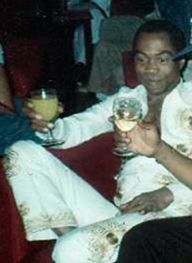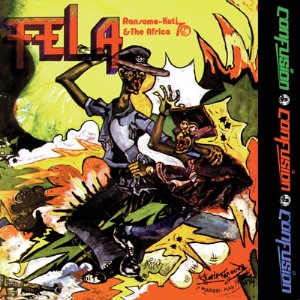
Afrobeat is a West African music genre, fusing influences from Nigerian and Ghanaian music, with American funk, jazz, and soul influences. With a focus on chanted vocals, complex intersecting rhythms, and percussion, the style was pioneered in the 1960s by Nigerian multi-instrumentalist and bandleader Fela Kuti, who popularised it both within and outside Nigeria. At the height of his popularity, he was referred to as one of Africa's most "challenging and charismatic music performers."

Peter Edward "Ginger" Baker was an English drummer. His work in the 1960s and 1970s earned him the reputation of "rock's first superstar drummer", for a style that melded jazz and African rhythms and pioneered both jazz fusion and world music.

Fela Aníkúlápó Kútì was a Nigerian musician and political activist. He is regarded as the principal innovator of Afrobeat, a Nigerian music genre that combines West African music with American funk and jazz. At the height of his popularity, he was referred to as one of Africa's most "challenging and charismatic music performers". AllMusic described him as "a musical and sociopolitical voice" of international significance.

Charles Tolliver is an American jazz trumpeter, composer, and co-founder of Strata East Records.

Fred Wesley is an American trombonist who worked with James Brown in the 1960s and 1970s, and Parliament-Funkadelic in the second half of the 1970s.

Roy Anthony Hargrove was an American jazz musician and composer whose principal instruments were the trumpet and flugelhorn. He achieved worldwide acclaim after winning two Grammy Awards for differing styles of jazz in 1998 and 2002. Hargrove primarily played in the hard bop style for the majority of his albums, but also had a penchant for genre-crossing exploration and collaboration with a variety of hip hop, neo soul, R&B and alternative rock artists. As Hargrove told one reporter, "I've been around all kinds of musicians, and if a cat can play, a cat can play. If it's gospel, funk, R&B, jazz or hip-hop, if it's something that gets in your ear and it's good, that's what matters."
Afro rock is a style of rock music with African influences. Afro rock is a dynamic interplay between Western rock music and African musical elements such as rhythm, melodies and instrumentation. Afro rock bands and artists in the late 1960s and early 1970s included Osibisa, Assagai and Lafayette Afro Rock Band.

Breakestra is a ten-piece funk "orchestra" from Los Angeles, California, formed by Miles Tackett in 1996.

Zombie is a studio album by Nigerian Afrobeat musician Fela Kuti. It was released in Nigeria by Coconut Records in 1976, and in the United Kingdom by Creole Records in 1977.

Knitting Factory Records is an independent American music label that is notable for promoting a variety of artists, including the music of deceased Nigerian political activist Fela Kuti. The label promotes a variety of music artists including Ages and Ages, Ash Black Bufflo, Cuong Vu, Graham Haynes, Femi Kuti, Gary Lucas, Lumerians, Thomas Chapin, Patrolled By Radar, Joe Morris, Rachid Taha, Seun Kuti, and Shilpa Ray and her Happy Hookers.
Edwin L. Birdsong was an American keyboardist and organist, known in the 1970s and 1980s for his experimental funk/disco music. Birdsong did not achieve much chart success, but developed a strong fan base. Birdsong has also been sampled by other artists many times, most famously by Daft Punk who sampled "Cola Bottle Baby" in "Harder, Better, Faster, Stronger", and Gang Starr who sampled his single "Rapper Dapper Snapper" for their song "Skills".

Everybody Loves the Sunshine is a studio album by Roy Ayers released under the Roy Ayers Ubiquity umbrella. It was released through Polydor Records in 1976. It peaked at number 51 on the Billboard 200 chart. In 2016, Pitchfork placed the title track at number 72 on the "200 Best Songs of the 1970s" list.
Nabil Ayers is an American music industry entrepreneur, author, musician and podcast host.

Confusion is a 1975 album by Nigerian Afrobeat musician Fela Kuti and his Africa 70 band. It was arranged, composed, and produced by Kuti, who recorded the album after choosing to emphasize his African heritage and nationalism in his music. Confusion is a commentary on the confused state of post-colonial Lagos and its lack of infrastructure and proper leadership at the time. Kuti's pidgin English lyrics depict difficult conditions in the city, including a frenetic, multilingual trading market and inextricable traffic jams in Lagos' major intersections.

Virgo Vibes is the second studio album by American jazz vibraphonist Roy Ayers, released in 1967 by Atlantic Records.

Ray Joseph Lugo is an American musician. Singing in English and Spanish, Lugo is internationally known for his prolific output and diverse solo work, as well as for leading the groups Kokolo Afrobeat Orchestra, Ray Lugo & The Boogaloo Destroyers and other projects.

Mystic Voyage is a studio album by Roy Ayers Ubiquity. It was released in 1975 through Polydor Records. Recording sessions for the album took place at Kaye-Smith/Van Ackeren Studios in Seattle, Washington and at Electric Lady Studios in New York City. This album is dedicated to the memory of Julian "Cannonball" Adderley.

Africa, Center of the World is a studio album by American musician Roy Ayers. It was released in 1981 through Polydor Records. Recording sessions for the album took place at Artisian Sound Recording Studio in Hollywood, California and Sigma Sound Studios in New York City. The album is dedicated to Fela Kuti and Bob Marley.
This is the discography of American vibraphonist and record producer Roy Ayers.
Wayne K. Garfield was an American composer, collaborating songwriter, vocalist, social entrepreneur, community activist, and producer, who was born in 1952 in New York City. He co-founded of the music collective Change, which launched the career of Luther Vandross with the hit song "The Glow of Love" which became #1 on the Billboard Dance/Disco Chart in the summer of 1980.In addition, Garfield’s songs appear on Platinum-Plus recordings by Luther Vandross, J. Cole, Now! 7, and Janet Jackson. Garfield was an active participant in the National Basketball Association (NBA), and internationally as a player representative. Among his successful clients were NBA Summer League standout, Chedney Gray and Jimmy Baxter, who in 2006 was the recipient of the France basketball league’s Sixth Man of the Year and Newcomer of the Year.

















